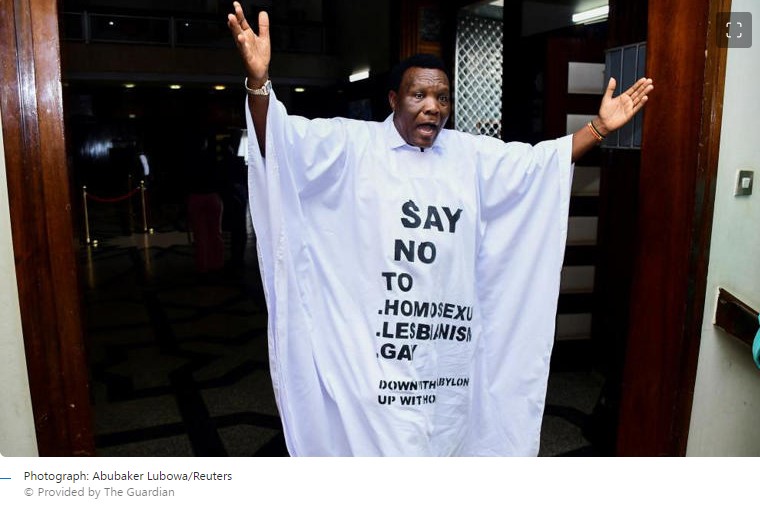Ugandan MPs pass bill imposing death penalty for homosexuality

MPs in Uganda have passed a controversial anti-LGBTQ+ bill, which would make homosexual acts punishable by death, attracting strong condemnation from rights campaigners.
Nearly all of the 389 legislators voted late on Tuesday for the hardline anti-homosexuality bill, which introduces capital and life imprisonment sentences for gay sex and “recruitment, promotion and funding” of same-sex “activities”.
“A person who commits the offence of aggravated homosexuality and is liable, on conviction to suffer death,” reads the bill introduced by Robina Rwakoojo, the chairperson for legal and parliamentary affairs.
Just two MPs from the ruling party, Fox Odoi-Oywelowo and Paul Kwizera Bucyana, opposed the new legislation.
“The bill is ill-conceived, it contains provisions that are unconstitutional, reverses the gains registered in the fight against gender-based violence and criminalises individuals instead of conduct that contravenes all known legal norms,” said Odoi-Oywelowo.
“The bill doesn’t introduce any value addition to the statute book and available legislative framework,” he said.
An earlier version of the bill prompted widespread international criticism and was later nullified by Uganda’s constitutional court on procedural grounds. The bill will now go to President Yoweri Museveni, who can veto or sign it into law. In a recent speech he appeared to express support for the bill.
One MP in the chamber, John Musila, wore a T-shirt reading: “Say No To Homosexual, Lesbianism, Gay.”
The bill marks the latest in a string of setbacks for LGBTQ+rights in Africa, where homosexuality is illegal in most countries. In Uganda, a largely conservative Christian country, homosexual sex was already punishable by life imprisonment.
Human rights campaigners have condemned the new move to enact the harsh law, describing it as “hate legislation”.
“Today marks a tragic day in Uganda’s history. @Parliament_Ug has passed legislation that promotes hatred and seeks to strip LGBTIQ individuals of their fundamental rights!” tweeted Sarah Kasande, a Kampala-based lawyer and human rights activist.
“The provisions of the anti-homosexuality bill are barbaric, discriminatory and unconstitutional,” she said.
She added: “To the LGBTIQ community, I know this is a difficult day, but please don’t lose hope. The battle is not over; this repugnant bill will ultimately be struck down.”
Gay activist Eric Ndawula tweeted: “Today’s events in parliament are not just immoral, but a complete assault on humanity. It’s frightening that our MPs’ judgment is clouded by hate & homophobia. Who benefits from this draconian law?”
More than 110 LGBTQ+ people in Uganda reported incidents including arrests, sexual violence, evictions and public undressing to advocacy group Sexual Minorities Uganda (Smug) in February alone. Transgender people were disproportionately affected, said the group.
Kasha Jacqueline Nabagesera, a lesbian activist in Kampala, said efforts to overturn the legislation would continue.
“We shall continue to fight this injustice. This lesbian woman is Ugandan even this piece of paper will [not] stop me from enjoying my country. Struggle just begun,” said Nabagesera in a tweet.
Kasande said: “We will fight until all individuals in Uganda can enjoy the rights guaranteed to them by the constitution.”
President Museveni last month said Uganda will not embrace homosexuality, claiming that the west was seeking to compel other countries to “normalise” what he called “deviations”.
“The western countries should stop wasting the time of humanity by trying to impose their practices on other people,” said Museveni in a televised address to parliament on 16 March.
“Homosexuals are deviations from the normal. Why? Is it by nature or by nurture? We need to answer those questions. We need a medical opinion on that,” he said.
“It’s disappointing that parliament would, once again, pass a bill that is clearly in contravention of several basic human rights,” said Oryem Nyeko, a researcher in the Africa division at Human Rights Watch.
“This just opens the door for more regressive laws and for people’s rights to be violated across the board. President Museveni shouldn’t assent to it,” he said.







